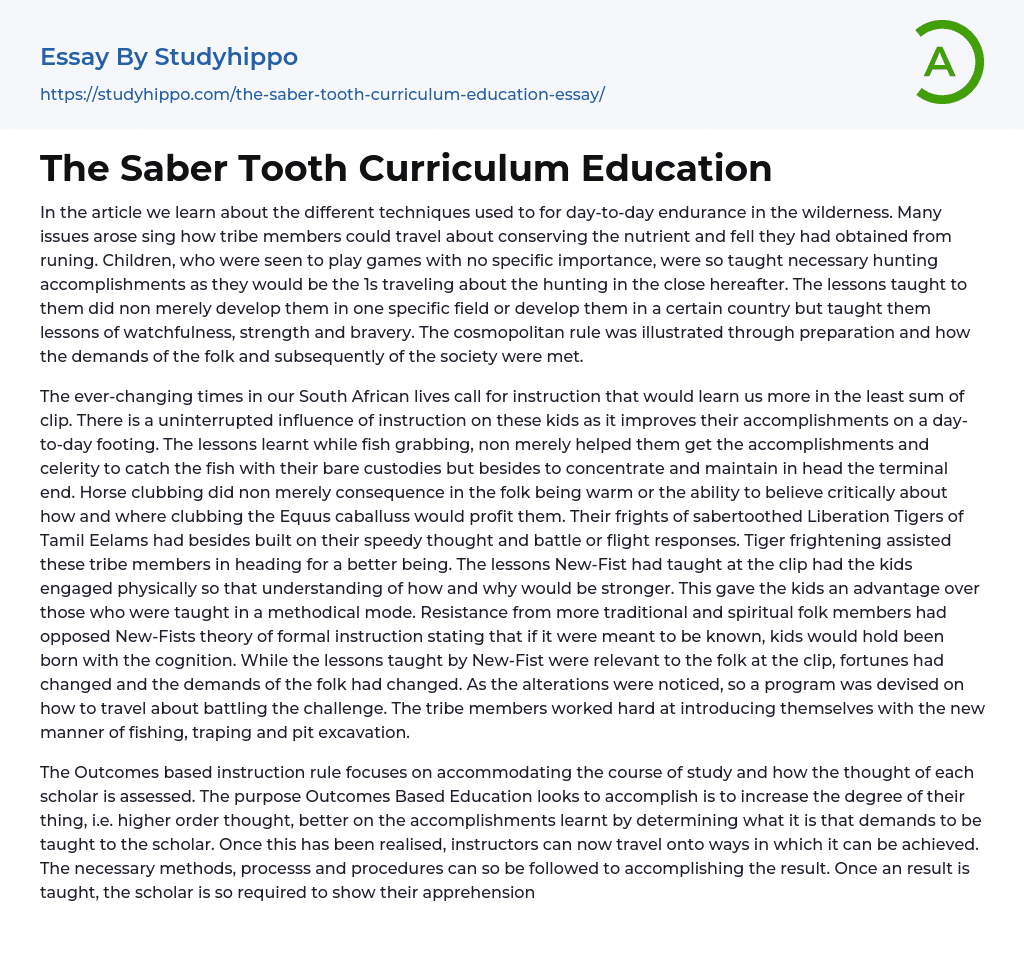The article discusses various techniques used for day-to-day endurance in the wilderness. It addresses the issues surrounding tribal members' ability to travel while conserving nutrients and the skills they acquired through hunting. Children, often engaged in games without apparent importance, were taught essential hunting skills as they would be responsible for hunting in the future. These lessons not only developed their abilities in specific areas but also taught them the values of vigilance, strength, and bravery. The article highlights how training exemplified the universal principle of meeting the needs of the community and society as a whole. Given the dynamic nature of South African life, education should prioritize teaching as efficiently as possible. Continuous education greatly impacts these children by improving their skills on a daily basis. The lessons learned while fish grabbing, for example, not on
...ly equipped them with the agility to catch fish with their bare hands but also taught them focus and goal-setting. Horse clubbing not only warmed the community but also fostered critical thinking about when and where to club horses for their benefit. Moreover, their fears of sabertoothed Liberation Tigers of Tamil Eelams strengthened their quick thinking and fight or flight responses.Tiger assisting the tribe members in improving their well-being was a frightening experience. The lessons taught by New-Fist engaged the children physically, which made their understanding of concepts stronger. This gave them an advantage over those who were taught in a systematic way. However, resistance from traditional and spiritual members of the tribe opposed New-Fist's theory of formal instruction, arguing that knowledge should be innate. Nevertheless, as circumstances changed, a plan was devised to tackle this challenge. The tribe
members worked hard to adapt to new fishing, trapping, and pit excavation techniques. The principle of Outcomes Based Education focuses on adjusting the curriculum and assessing the thinking abilities of each student. The goal is to enhance higher-order thinking skills by determining what needs to be taught. Once this is realized, teachers can then plan strategies to achieve the desired outcomes through appropriate methods, procedures, and processes.Once a result is taught, the scholar must demonstrate their understanding of the result as if it were in a real-life situation. These results assess content knowledge, recall of the information taught, and the application of that knowledge. Results Based Education can be seen in the ideas of educational theorist Ralph Tyler. The curriculum should have clear educational objectives or goals that students can relate to modern and realistic situations. Tyler believed that to comprehend and master a principle, one must experience it. Although many of us have had what Tyler would call an "educational experience," it may not align with the objectives, so administration and management of these experiences are crucial (e.g. excursions and field trips to study the subject in its natural environment). A clear connection between topics in the curriculum needs to be established in order for students and scholars to understand their similarities. Some aspects of the subject matter in the curriculum may appear complex to teachers and learners, so a thorough explanation and repetitive study will aid in comprehension. As with many studies, regular evidence of success must be obtained. Evaluating the topic and the knowledge acquired by the learner is vital for assessing the effectiveness or failure of the instruction content.Cardinal constructs in
the Outcomes Based Education course of study are presented through the viewpoints of Tyler, Lawrence Stenhouse, and Paolo Freire. These constructs include acquisition through experience, focal point on the learning country's content and accomplishments, and individual acquisition. Results-Based Education is also seen as competence-based, with a teacher-learning process aimed at better preparing learners for their roles. The National Curriculum Statement identifies subjects with valuable knowledge, skills, and values at Level 4 on the National Qualifications Framework (NQF). It aims to provide meaningful information as well as knowledge and skills that would benefit individuals. The subject content focuses on local contexts while considering diverse perspectives from parents, learners, teachers, and society as a whole. The primary goals of the National Curriculum Statement are to prepare learners for post-school life by considering various factors such as background, race, gender, and abilities. This ensures that learners are equipped with appropriate career opportunities.It offers scholars the opportunity to pursue higher education and advanced studies, if they desire, as well as the necessary tools for transitioning from a learning environment to the workforce. Additionally, it enables the institution where scholars choose to work to prioritize the competency of the scholar. The various curricula demonstrate a connection between them, including the Saber-toothed Curriculum. All curricula are learner-centered and aim to equip scholars with skills that are not only applicable within their own environment or situation but also universally.
- Interpretation essays
- Plagiarism essays
- Analogy essays
- Learning English essays
- Academia essays
- Academic And Career Goals essays
- Academic Integrity essays
- Brainstorming essays
- Brown V Board of Education essays
- Brown Vs Board Of Education essays
- Coursework essays
- Curriculum essays
- Distance learning essays
- Early Childhood Education essays
- Education System essays
- Educational Goals essays
- First Day of School essays
- Higher Education essays
- Importance Of College Education essays
- Importance of Education essays
- Language Learning essays
- Online Education Vs Traditional Education essays
- Pedagogy essays
- Philosophy of Education essays
- Purpose of Education essays
- Scholarship essays
- Study essays
- Studying Abroad essays
- Studying Business essays
- Technology in Education essays
- The Importance Of Higher Education essays
- Vocabulary essays
- Writing Experience essays
- Coaching essays
- Critical Thinking essays
- homework essays
- Learning essays
- Library essays
- Listening essays
- Literacy essays
- Mentor essays
- Physical Education essays
- Project essays
- Reading essays
- Research essays
- Sex Education essays
- Social Studies essays
- Standardized Testing essays
- Study Plan essays
- Teaching essays




